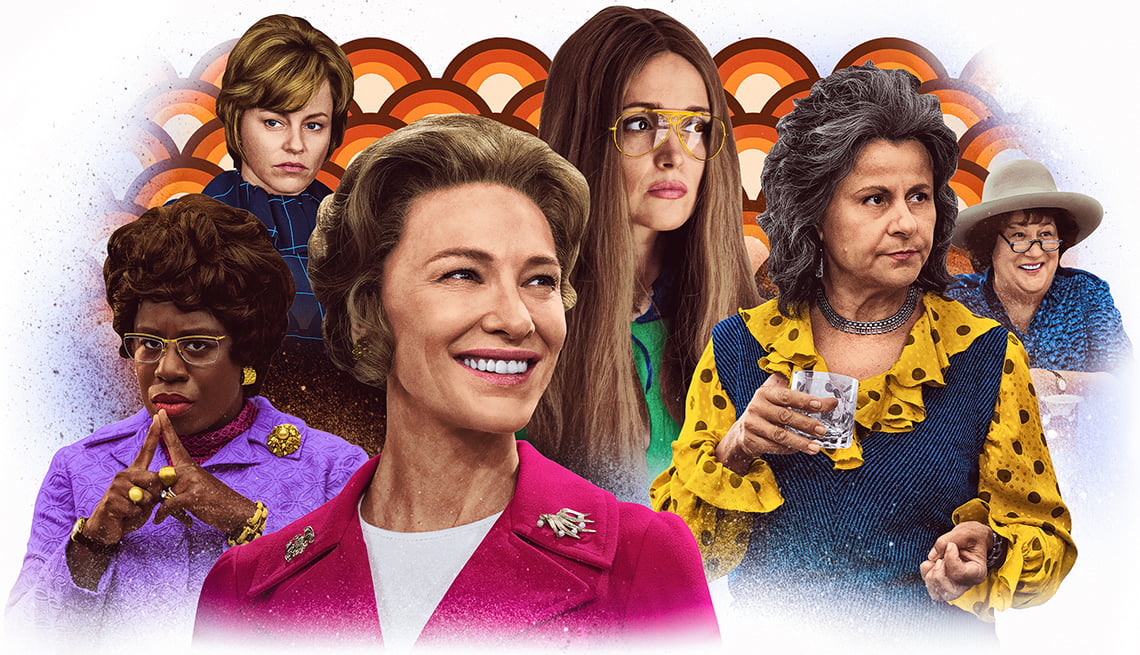Hulu’s latest miniseries Mrs. America drops the viewer smack-down in the middle of the second wave of the feminist movement, following the fight to get the Equal Rights Amendment (ERA) ratified which is met with an unexpected backlash from a group of conservative housewives.
In Mrs. America, we see prominent feminists like Gloria Steinem (Rose Byrne), Betty Freidan (Tracey Ullman), Shirley Chisholm (Uzo Abuda), Bella Abzug (Margo Martindale), Jill Ruckelshaus (Elizabeth Banks), Brenda Feigen (Ari Graynor) and Florynce Kennedy (Niecy Nash) trying to get the ERA ratified in 38 states. A fight they (spoiler, for history?) came close to winning, but ultimately lost due to relentless campaigning by Phyllis Schlafly (Cate Blanchett), a politically-active conservative woman.
Telling the story from both the feminist and conservative point of views, giving more screen time to the latter, the show provided a window into the strong points and shortcomings of both the anti and pro-ERA movements. When the conservative group rallies for women to stay inside their homes all the while aiming for powerful government positions, the irony is hard to miss. Similarly, when a black queer woman brings up the subject of “tokenism in the workplace” to her all-white feminist co-workers and gets an unenthusiastic response, the lack of intersectionality in the feminist movement is again, hard to miss.
In ‘Mrs. America‘, we see prominent feminists like Gloria Steinem (Rose Byrne), Betty Freidan (Tracey Ullman), Shirley Chisholm (Uzo Abuda), Bella Abzug (Margo Martindale), Jill Ruckelshaus (Elizabeth Banks), Brenda Feigen (Ari Graynor) and Florynce Kennedy (Niecy Nash) trying to get the ERA ratified in 38 states. A fight they (spoiler, for history?) came close to winning, but ultimately lost due to relentless campaigning by Phyllis Schlafly (Cate Blanchett), a politically-active conservative woman.
But hands down, the most surprising (and unexpected) element of the show was the subtle presentation of the groundwork being done to the extremist style of politics that has become so common today. The kind where fear mongering, whataboutery and spreading fake news are considered normal. When Rosemary Thompson (Melanie Lynskey), a conservative housewife, urges another member of their group to simply disregard factual information that goes against their argument, or when Phyllis Schlafly exaggerates a situation to be more effective, it’s hard not to feel uncomfortable considering our current political reality.
In one of the stand out episodes in Mrs. America, the writers explored the ‘blind follower’ narrative with Schlafly’s trusted friend Alice (Sarah Paulson), who is shown having an epiphany-of-sorts when she realizes how more than anything, she is actually scared of Phyllis and most of their arguments are more about pushing others down, rather than standing up for their own rights.

Shining a light on the psychology of a follower, Alice, the only fictional (main) character of the show, provides the viewer with some kind of an answer (and resolution) for her existence. Why do people follow such authoritarian people? What are they getting from this relationship? What led them to this place? Addressing such questions, the writers brought a significant level of nuance while dissecting the follower-mentality of the character.
In each new episode, ‘Mrs. America‘ presented the viewer with a new quandary, ranging from issues like abortion and sexual harassment to homosexuality and racism; but the fact that these women, no matter their ideologies, at the end of the day are in the same patriarchal system, trying to be taken more seriously, wasn’t lost on anyone.
While Mrs. America does take its fair share of creative liberties, it can undoubtedly work as a great window into the American feminist movement of the 70’s. After all, the cast is outstanding, pacing is perfect and the characters are fleshed out with as much accuracy as possible, although in Phyllis Schlafly’s case, the show probably just did her a favor. Not to mention, the colorfully illustrative title sequence deserves an award of its own! With the fun and energetic music of Walter Murphy’s ‘A Fifth of Beethoven’, in under a minute, the title sequence shows the journey of the ERA where a group of women are showcased opposing another group of women for the rights of…women.
Also read: Film Review: Sitara Highlights The Dreams That Will Not Take Flight
In each new episode, Mrs. America presented the viewer with a new quandary, ranging from issues like abortion and sexual harassment to homosexuality and racism; but the fact that these women, no matter their ideologies, at the end of the day are in the same patriarchal system, trying to be taken more seriously, wasn’t lost on anyone.
Taking advantage of hindsight, the writers examined the patriarchy in the 70’s and the lengths to which women were accepted to be radical. The nuanced writing showed how women are taught to internalize the patriarchy, become immune to the contradictions of their beliefs and fight amongst their own gender, something that was personified in Phyllis Schlafly. I mean, even though the two groups in this ERA debate were filled with women, the fact that it’s the men who would make the ultimate decision made for a rather sad reality.

Maybe watching a show about men sitting in positions of power making disappointing decisions may sound uninviting in our current state of crisis where a new group of men in power are making frustrating decisions, but Mrs. America tackles that feeling of helplessness head-on with its tenacity.
Also read: From Catsuits To Captains – The Evolution Of Women In ‘Superhero’ Films
Even though the show is about a very specific movement, at a specific time, in a specific country, dealing with a specific issue; the universal theme of perseverance and continuing to fight the good fight will strike a chord with just about everyone. Not to mention, this is some great television right here!
Shivani Yadav is a fashion, film and popculture writer. In her free time, you’ll find her thinking about the state of the world like a snotty pipe-smoking, monocle-wearing 19th century man. You can find her on her Blog, Facebook, Twitter and Instagram.
Featured Image Source: Lez Watch TV
About the author(s)
Shivani Yadav is a literary translator and popculture writer. Her work has appeared in literary journal, Kitaab, along with online websites like Firstpost, Bound India, Kunzum, LiveWire and Film Companion. She’s currently studying Psychology and working as a translator at Chambal Media and Khabar Lahariya, India’s only grassroots feminist news organization. You can find her on X and Instagram and read her popculture newsletter.





Absolutely right. This is also going to be new normal
Lovely article by Shivani. First time I am reading this subject, very aptly explained. Thanks